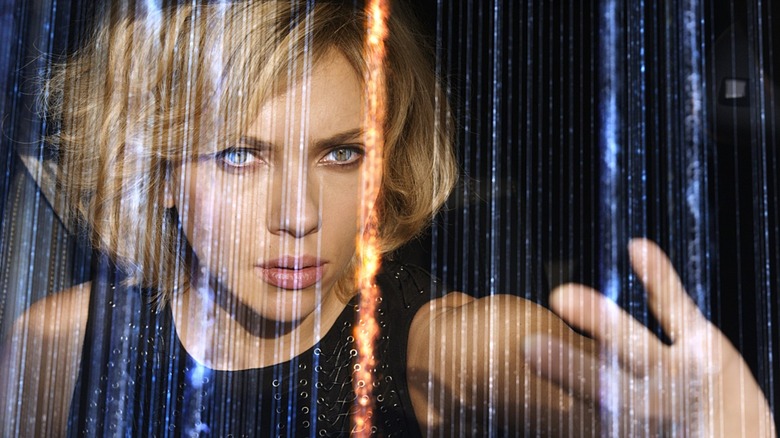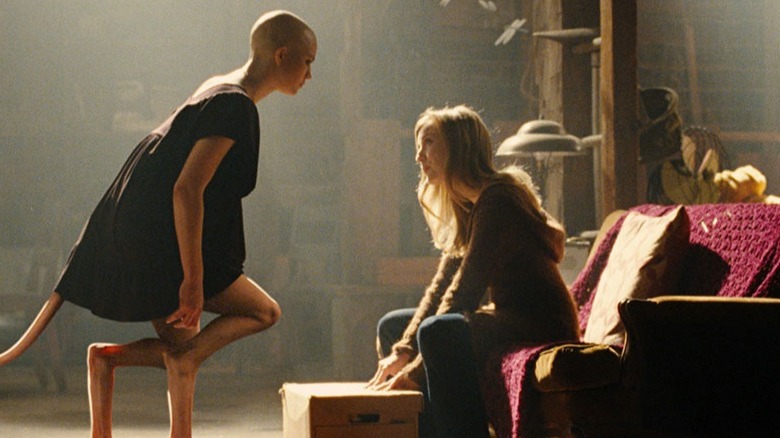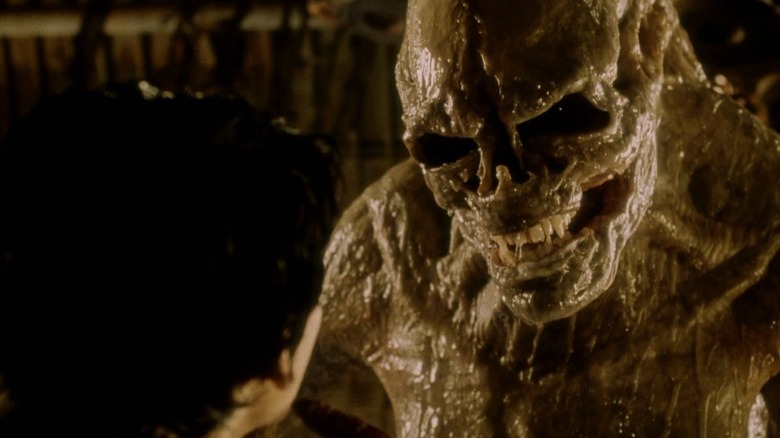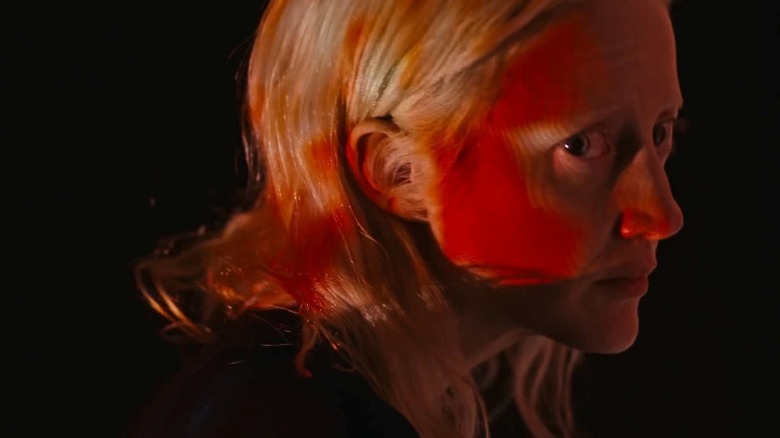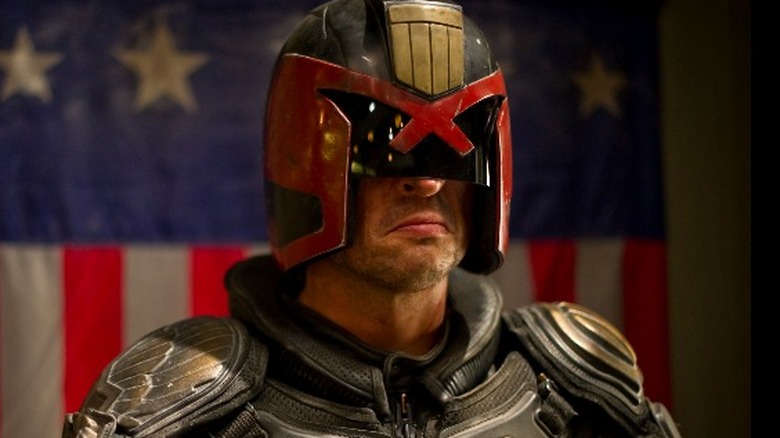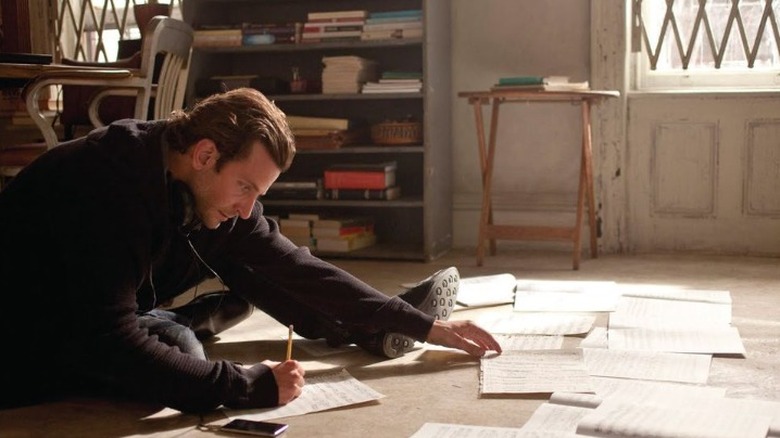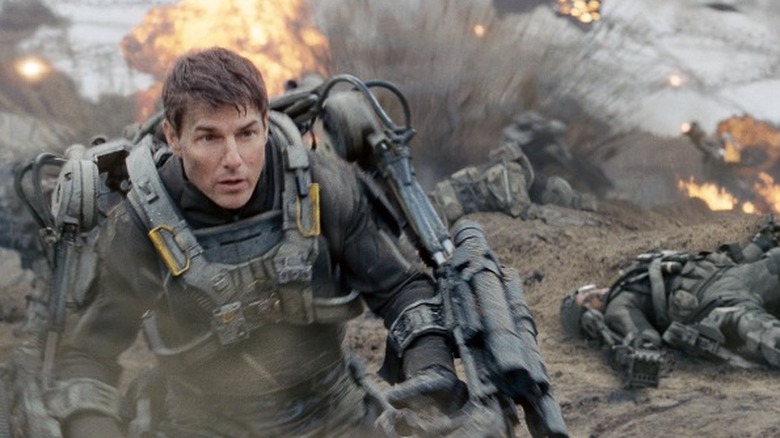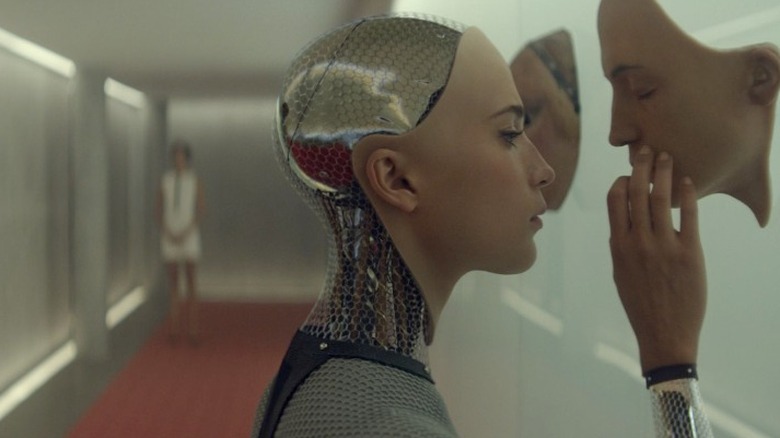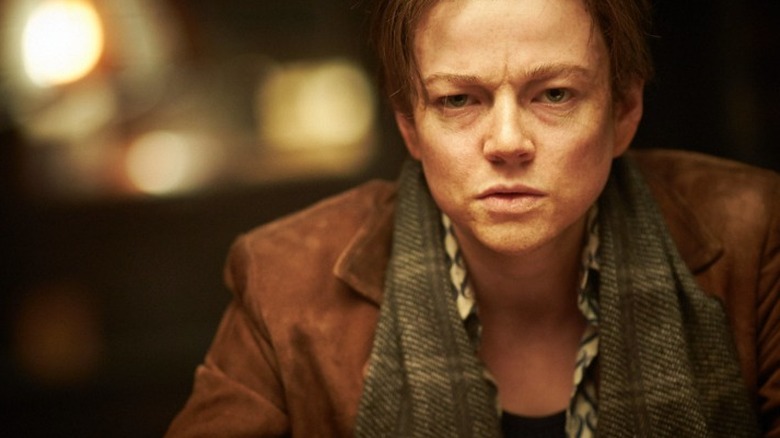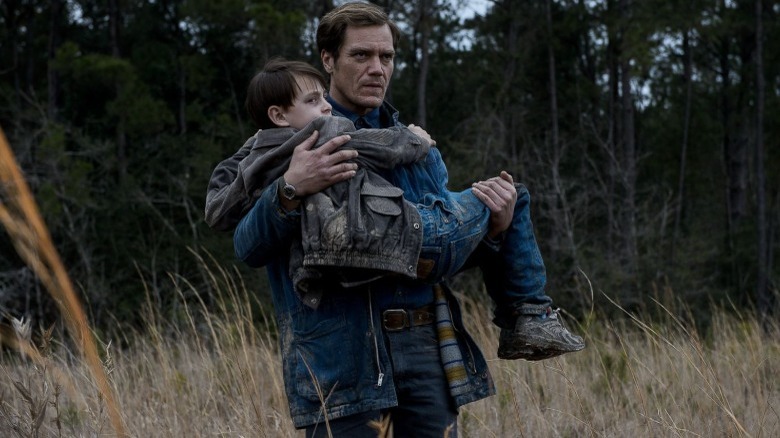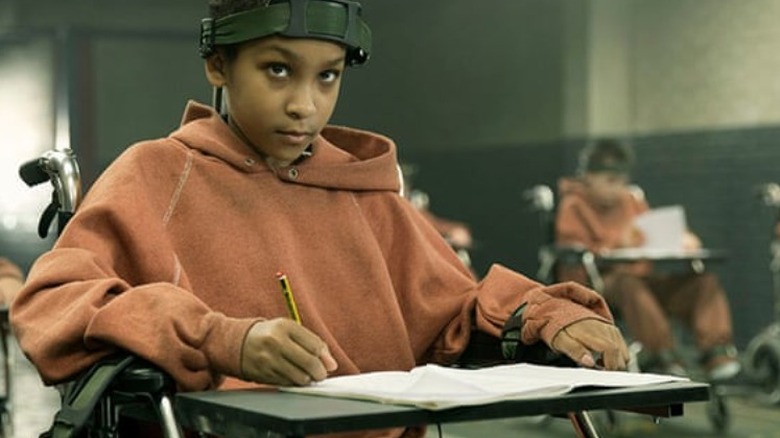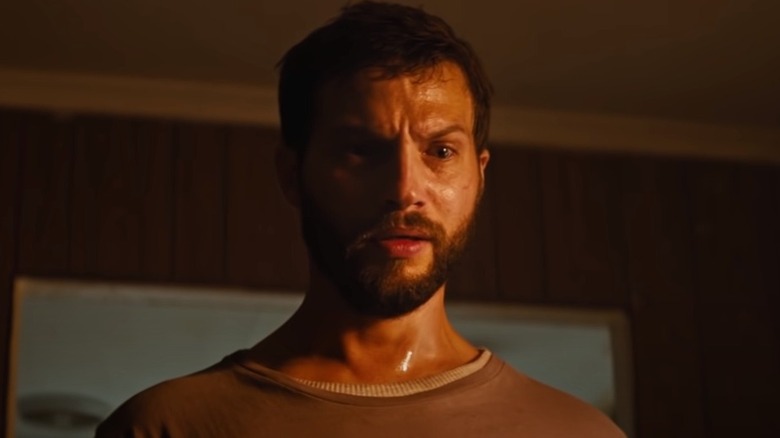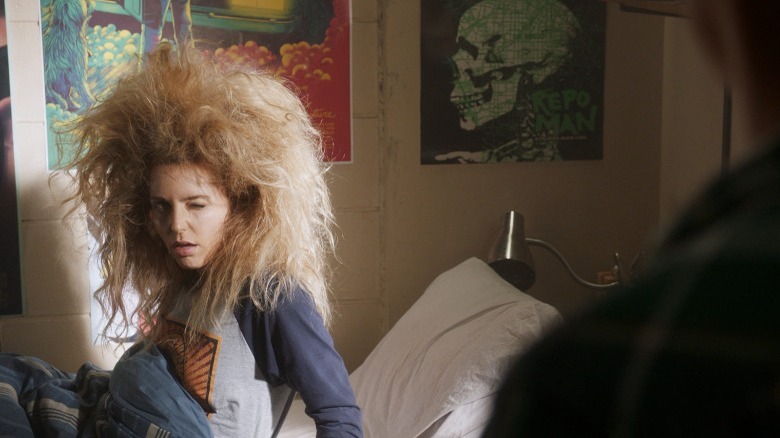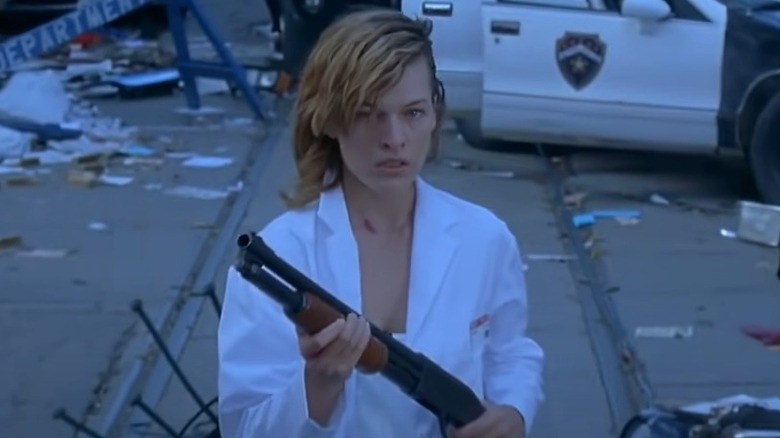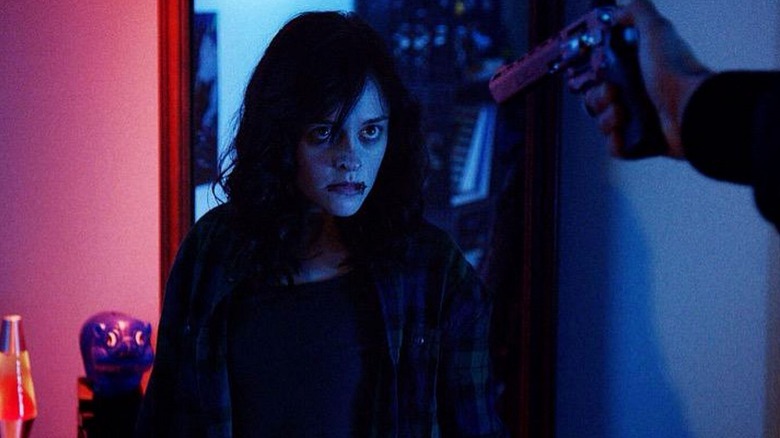Movies Like Lucy That Sci-Fi Fans Need To Watch
In "Lucy," Morgan Freeman's Professor Samuel Norman tells us that human beings only use, at most, 10% of their brains. Of course, this is nonsense. Still, Luc Beeson's rollicking and visually rich sci-fi action outing is almost 100% fun. What it lacks in narrative depth and subversive elements, it more than makes up for with fantastic set pieces, grisly violence, and a fantastic Scarlett Johansson at the center.
After a bag containing a synthetic drug bursts in her stomach, Johansson's Lucy Miller develops considerable physical and mental abilities, including (though not limited to) telepathy, time travel, Carrie White-esque telekinesis, and insensitivity to pain.
An early precursor to the likes of "Atomic Blonde," "Red Sparrow," and "Anna," "Lucy" is responsible, at least in part, for the recent trend of female-led action flicks titled with women's names. Yet, most of the movies it inspired dial back the science fiction elements for grittier, more grounded tales. Here, though, we'll be recounting 15 movies like "Lucy" that honor both its sci-fi action and artificially enhanced lead. Fire up your Blu-ray player because the movies are guaranteed to power up movie night.
Splice
"Splice" was missed by many, mostly because its marketing — and general conceit — were really weird. Adrian Brody and Sarah Polley star as Clive Nicoll and Elsa Kast in Vincenzo Natali's 2009 science fiction horror hybrid. Natali makes use of the same wickedly subversive, transgressive spirit that rendered "Cube" the cult classic it is. "Splice" never shies away from the material's innate weirdness.
Clive and Elsa are genetic engineers looking to splice DNA to create revolutionary medical advances. Both, however, are interested in splicing human and animal DNA, an act forbidden by their employers, N.E.R.D. (Nucleic Exchange Research and Development). They do so anyway and are successful in splicing a viable embryo that rapidly develops into an adult-sized hybrid they name Dren (Delphine Chanéac). Psychosexual undercurrents abound as Dren's interests shift from the parental to the sexual, and as she develops, the homicidal. It's twisted stuff. Dren, like "Lucy," progresses quickly, and her physical and mental abilities soon eclipse the brilliant minds who created her. Largely forgotten, "Splice" warrants another look.
Under the Skin
Other than her Oscar-nominated roles in "Marriage Story" and "Jojo Rabbit," Scarlett Johansson's career these past several years is all but defined by her perennial role as Marvel's Black Widow. Despite appearances in action fare such as "Lucy" and "Ghost in the Shell," the Marvel Cinematic Universe seemed to be a priority for Johansson. Although she is one of the highest-paid actresses in the world, Johansson, more often than not, is willing to experiment, collaborating on unusual projects that expand the capacity of what filmmaking is and should be.
In 2014, she assumed the lead role in Jonathan Glazer's "Under the Skin," a sci-fi horror hybrid about an alien woman who preys on men in Scotland. It's an austere and aggressively stylish horror outing with fantastical science fiction elements. It engages the brain just as often as it sends chills down the spine. While its $13 million budget isn't exactly small, it's a far cry from the mammoth costs the MCU's output demands, and it's thrilling to see Johansson return to her more modest roots. Her portrayal of the otherworldly woman is sensational, easily grounding "Under the Skin's" thematic underpinnings. Loneliness, gender, and sexuality are all at play in this inimitable horror hybrid that truly does get under the skin.
Alien Resurrection
Jean-Pierre Jeunet's "Alien Resurrection" might just very well be the first genre "requel." Much like "Halloween: H20," released just one year later, it retrofitted a new narrative onto a genre series that had ostensibly ended conclusively. Sigourney Weaver's Ellen Ripley, upon finding out she was host to an alien embryo, sacrificed herself at the end of David Fincher's divisive (though criminally underrated) "Alien 3." Money talks, however, and Ripley was somehow cloned, finding herself hurtling through space on the USM Auriga 200 years later.
A souped-up version of the original Ripley (thanks to a nice dollop of Xenomorph DNA in her system), clone Ripley, like Lucy, is capable of withstanding immense pain and possesses superhuman strength and dexterity. "Alien Resurrection" leans farther into the science fiction elements than its predecessors, supplanting the claustrophobic terror of the first film with bombastic action, cool gadgetry, clones, superhumans, and lots and lots of gore. While it isn't the strongest entry in the long-running franchise, it is one of the most distinct. It has an identity that stands out. Brazen in some of its narrative shifts, it still delivers what audiences want: Ellen Ripley kicking alien butt.
Possessor
If you haven't seen it already, stop reading this now and go watch Brandon Cronenberg's "Possessor." Brandon Cronenberg, son of esteemed body-horror auteur David Cronenberg, created a science fiction horror masterpiece with Possessor." It's grim, gory, enigmatic, and abstract — just simply sensational stuff. Andrea Riseborough and Christopher Abbott are two parts of a mysterious whole in the film.
Riseborough's Tasya Vos is an assassin for an arcane organization with the capacity to allow its assassins to take control of other peoples' bodies. Tasya is suffering considerably on account of the work, both mentally and physically. Taking over another person's brain can't be easy. She agrees to one last job and takes over the body of her latest target, Colin Tate (Christopher Abbott), the fiancé of a wealthy CEO's (Sean Bean) daughter.
"Possessor" is both consistently entertaining and rich in wonder. With smatterings of graphic violence, it earns its horror moniker, but the science fiction elements excel. Like the best of the genre, it poses and deliberately refuses to answer profound questions on identity, morality, and control. It's a singular, brutal work that is uniquely capable of possessing its audience and never letting them go.
Dredd
Like "Upgrade," "Dredd" is just cool. Karl Urban stars as the titular Judge Dredd from the comic series of the same name from John Wagner and Carlos Ezquerra. In a dystopian society, judges are permitted to act as judge, jury, and executioner, and after Lena Heady's Madeline "Ma-Ma" Madrigal takes over a 200 story high rise by distributing Slo-Mo, a new drug that reduces the user's perception of time, Dredd and his apprentice, Judge Anderson (Olivia Thirlby), are tasked with taking her down.
"Dredd" is considerably better realized than the 1995 Sylvester Stallone vehicle "Judge Dredd." The action is more skillfully staged, the violence is accelerated, and there's a more fully realized, dystopic vision at play. Yet, like its forebear, "Dredd" flopped, grossing just $41 million against a $30 million budget. While it found more success on home video, it remains an underappreciated classic. It's a gritty, violent, drug-infused science fiction stunner and shouldn't be missed.
Limitless
In a sense, "Limitless" is "Lucy" with Bradley Cooper in the Scarlett Johansson role. Directed by Neil Burger from Alan Glynn's 2001 novel, "The Dark Fields" (which was later adapted into a swiftly-canceled television series), "Limitless" sees Bradley Cooper unlocking the full potential of his brain after taking NZT-48, a nootropic drug that allows him to use his brain at its fullest capacity. Eddie is capable of incredible recall, stellar interpersonal skills, and even develops profound inspiration for his next writing project. Where can I get some of that NZT-48?
It's not all fun, though. Cooper's Eddie Morra is soon embroiled in a murder mystery, finds himself being stalked, and must grapple with the discovery that everyone who has previously taken the drug is either in the hospital or deceased. A box-office success at the time of its release, "Limitless" might not attain classic status, but it's still a fun, inventive, and thought-provoking foray into the full potential of the human mind and the folly innate in unlocking it.
Edge of Tomorrow
"Edge of Tomorrow" is unequivocally one of this century's best science fiction movies — even if it was ridiculously retitled "Live Die Repeat" for its home video release. Adapted from the Japanese novel, "All You Need Is Kill" (a much cooler title) by Hiroshi Sakurazaka, Doug Liman's "Edge of Tomorrow" is set in an alien-occupied Europe. Tom Cruise stars as public relations officer Major William Cage, who is thrust into a time loop while combatting the invaders. You see, the alien aggressors, known as "Mimics," can reset the day until they win the battle. Cruise, by dint of exposure to Mimic blood, also has this ability. Cage and war hero Sergeant Rita Vrataski (Emily Blunt) team up to destroy the invaders once and for all.
"Edge of Tomorrow" is ceaselessly surprising. It's a bonafide masterpiece — a big-budget, science fiction epic abounding with A-list talent and profoundly engaging science. The action is stellar, the pathos effective, and unlike most high concept science fiction, the core conceit makes genuine sense within the logic of the film. Go watch "Edge of Tomorrow." You just might find yourself in a time loop of your own, desperate to watch it again and again.
Ex Machina
"Annihilation" director Alex Garland's directorial debut, "Ex-Machina," is so profoundly good that it genuinely needs to be seen to be believed. Domhnall Gleeson stars as Caleb Smith, a programmer invited to Nathan Bateman's (Oscar Isaac) rural estate for a one-week stay. Once there, he is introduced to Ava (Alicia Vikander), a robot enhanced with artificial intelligence. Nathan tasks Caleb with administering the Turing test, a method of measuring an artificially intelligent machine's ability to match or exceed human intelligence, to Ava during his stay. Nathan wants to know if Ava has consciousness and is capable of independent thought. He also wants to see if Caleb forgets that Ava is a machine.
If this sounds like a psycho-sexual horror thriller with science fiction undertones, it is. Caleb's loyalties shift as both Ava and Nathan pit him against the other. Vikander is especially incredible as Ava, maintaining an aura of humanity, yet adroitly masking her true intentions. It's never clear until the end what Ava's goal is. Trying to figure out whether Ava is genuine or playing a game makes the plot consistently tense, and it all culminates in a tempest of betrayal and violence. "Ex Machina" is about artificial intelligence, and it passes a Turing test of its own: It proves itself to be smarter than most contemporary science fiction fare.
Predestination
"Succession" fans won't want to miss identical twin brothers Michael and Peter Spierig's "Predestination," an adaptation of Robert Heinlein's 1959 short story "All You Zombies." "Succession's" Sarah Snook stars alongside Ethan Hawke as two parts of the same story. Hawke is a time-traveling agent looking to disarm a terrorist's bomb. Assuming the cover of a 1970s bartender, he meets Snook's "The Unmarried Mother," a sobriquet given Snook's male-passing appearance
Snook details their story, recounting a life of tragedy, gender transition, crushed dreams, and first love. The Spierig Brothers fill out the periphery with enough action and Ethan Hawke to develop considerable mainstream appeal. However, it's Snook's performance that makes "Predestination" what it is. Like "Lucy," it presents a profound thematic undercurrent regarding the disposability of women as test subjects for awful men and their awful whims. "Lucy" is much lighter and more mainstream. Nevertheless, the films complement each other. So get that "Lucy" and "Predestination" double-feature going!
Midnight Special
"Midnight Special" is a heartbreaking science fiction road trip. Jeff Nichols is a profoundly humanistic filmmaker as evinced by such films as "Loving" and "Take Shelter." However, "Midnight Special" might be his best film yet (especially since he's departed the upcoming "A Quiet Place" spinoff). Michael Shannon stars as Roy Tomlin, the father of eight-year-old Alton (Jaeden Martell), a boy born into a religious commune who possesses extraterrestrial abilities.
Tracked by the FBI, Roy meets up with Kirsten Dunst's Sarah (Alton's mother) and friend Lucas (Joel Edgerton) to keep Alton safe and out of the hands of people and agencies looking to either exploit or destroy him. I won't spoil the ending, but it is that distinct kind of conclusion that breaks hearts with a glint of hope. It's the only conceivable way this trip could have ended, but that doesn't detract from how profoundly it resonates. With a trio of fantastic performances, sparse yet effective special effects, and rare thematic resonance when it comes to the subjects of fatherhood and parenting, "Midnight Special" is special indeed.
The Girl with All the Gifts
I've written at length on how Sennia Nanua is Oscar-worthy in Colm McCarthy's "The Girl with All the Gifts." After a parasitic virus ravages the world, a community of survivors persist at a military installation, with the uninfected adults researching second-generation "hungries," the movie's version of the walking dead. These second-generation children still crave living flesh, but they have retained their humanity and are capable of speech, learning, and accelerated development because of their symbiotic relationship with the zombie virus.
After the facility is compromised, several researchers, including Gemma Arterton's Helen Justineau, escape with Nanua's Melanie, whom they all believe to be the key to humanity's survival. They travel through an apocalyptic English landscape in search of a cure while evading the first-generation hungries. A tense, terrifying zombie epic with shades of humanity, "The Girl with All the Gifts" is a gift indeed. Like "Lucy," it adroitly prioritizes the human element in superhumans.
Upgrade
Before "The Invisible Man," "Insidious" and "Saw," screenwriter Leigh Whannel delivered one of the century's best cyberpunk action thrillers with "Upgrade," a movie that is best described as just really, really cool. Although Whannel made his directorial debut with 2015's "Insidious: Chapter 3," he was working within an established framework in that film. With "Upgrade," he was given room to flex his directorial muscles, delivering a sensationally staged and choreographed science fiction revenge saga.
Logan Marshall-Green stars as auto mechanic Grey Trace. After his wife is murdered by four armed men — who also shoot Grey in the spine, paralyzing him — he accepts a STEM implant, a kind of biomedical chip that can enhance a person's motor functions. Along with regaining the ability to walk, Grey develops superhuman strength and combat skills. With his newfound powers, he tracks down the men responsible for his wife's death. While Whannel doesn't exactly mine new material here, he considerably upgrades genre conventions. "Upgrade" is a violent, dour cyberpunk dream.
Happy Death Day 2U
While fans desperately wait for production company Blumhouse to confirm any news on a third entry in Christopher Landon's "Happy Death Day" franchise, there is always the second entry, creatively titled "Happy Death Day 2U," to tide them over. Considerably removed from the first film's slasher roots, Landon's follow-up sees star Jessica Rothe's Tree Gelbman thrust back into a "Groundhog Day" time loop because of an on-campus quantum reactor.
Landon leans into the science fiction trappings of his premise much harder in this installment, all but removing the horror elements for comedic time travel antics. When the reactor malfunctions and Tree is sent into an alternate dimension, she must find a way out or relive the same day over and over again. It's wildly creative. Having done this before, Tree is considerably better equipped to handle whatever the time loop throws at her. Lighter and breezier than "Lucy," "Happy Death Day 2U" has a science fiction hero who more than earns her place among the best.
Resident Evil
While 2021's "Resident Evil: Welcome to Racoon City" leaned hard into the source material's horror roots, Paul W. S. Anderson's initial 2002 take on the popular video game is considerably more bombastic and campy. It's a science fiction hybrid that eschews its origins beyond the mere basics — namely zombies and the antagonistic Umbrella Corporation. Consequently, "Resident Evil" is a horror-tinged "Lucy" ancestor and a gore-infused foray into superpowered humans.
Anderson's wife, Milla Jovovich (who, interestingly enough, was formerly married to "Lucy" director Luc Besson), stars as Alice, an amnesiac who awakens in a rural manor and is swiftly thrust into an underground facility crawling with the undead. Alice is the series' mainstay, often killed and resurrected as part of the Umbrella Corporation's overarching plan. Jovovich relishes the physicality of the role, easily imbuing Alice with both the physical prowess and the humanity of the best action stars, even as the series grows sillier and sillier. Far from a masterpiece, "Resident Evil" still yields its own distinct charm.
The Mind's Eye
Joe Begos' "The Mind's Eye" is an underrated "Carrie" riff from 2015. It packs a bloody good B movie punch, abounding with gore and practical effects all but guaranteed to test the squeamish. With shades of Brian De Palma and John Carpenter, "The Mind's Eye" follows Zack Connors (Graham Skipper) and girlfriend Rachel Meadows (Lauren Ashley Carter) as they're pursued by a malicious doctor (John Speredakos) hellbent on harvesting their inexplicable psychokinetic abilities.
While it matches "Lucy" in terms of R-rated content, the small scale and cast of relative unknowns imbue it with a natural, grounded verisimilitude that Luc Besson's film lacks. Both Zack and Rachel make use of their diverse abilities to survive and thwart their capture, and all of it is depicted with gore and deranged humor in a synthetic, '80s grindhouse style. For fans of "Lucy" looking for a bloodier and smaller tale of superhuman abilities, set your sights on "The Mind's Eye."
